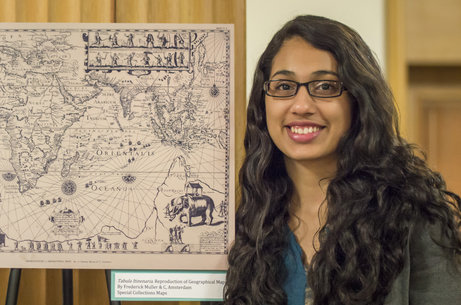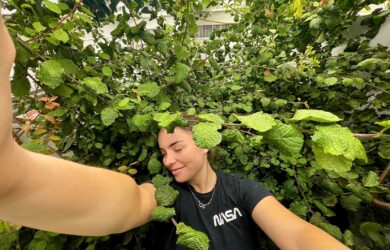
Anisha Bhat's research will focus on the history of the Siddi, the African diaspora in India.
Anisha Bhat is interested in questions of identity and in showing that identity for many people is often complex and multilayered.
Having been born in India and growing up in the US, she has her own personal reasons for that interest and this has fuelled her academic fascination with identity and in particular the interconnections between regions such as the Middle East, Africa and South Asia.
Her senior thesis at Pomona College was on the history of the Siddi people, the African diaspora in India, which she will take forward when she begins her MPhil in World History at Cambridge this autumn.
“I was interested in them because they are under-represented in the scholarship on the region and defy a nationalistic view of identity, the idea that people have one identity. From my own experience identity has always been complex. One of the most fascinating things about early modern history is the number of people who defy single, uncomplicated identities,” says Anisha [2015].
She has also been able to convey that academic interest to a wider audience. She and a fellow student curated an exhibition in the library at Pomona College on Islam and the Indian Ocean. One of her professors suggested she apply because of the research area of her senior thesis. The exhibition, which ran from October to December last year, highlighted the circulation of ideas, goods and people in the region of the Indian Ocean.
“It was really exciting and an opportunity to present a less Euro-centric narrative in that part of the world and a more culturally rich and dynamic view of Islam. There’s a lot of focus on Islam as being political and militant nowadays. The exhibition balanced that by showing it as also tolerant and culturally vibrant,” she says.
She adds: “It was a really good exercise in creating interesting narratives and trying to catch people’s attention and draw them in, to show them why I am interested in history,” she says. “Sometimes academia can get very ivory tower-esque and inaccessible. It is a good opportunity to bridge the gap between academics and the wider public.” The exhibition included the dream diary of one of the Muslim sultans who was overthrown by the British, “It gives the human element of history when you read his personal thoughts,” says Anisha.
She is now working on an online version of the exhibition and says it will get the knowledge she has curated out to a wider audience.
Childhood
Anisha was born in Bombay and moved to Pittsburgh, Pennsylvania, when she was three. A year later her family moved again to Illinois. She always loved school and spent much of her early years with her nose in a book. “I used to devour books,” she says. She entered a competition for who had read the most books at elementary school and read 120 books.
Early on she wanted to be a vet due to her love of animals, a passion that has continued. She has been working with an animal welfare project which sends people into elementary schools to teach them about cruelty to animals, how they can care for animals and how they can protect animals from abuse. After she left high school she was involved with an animal charity that rehabilitates animals that have been used as evidence in court cases of abuse or neglect who would otherwise be put down.
Despite her early ambitions to be a vet, she leant towards the humanities at school. She loved history and literature, was in the school French club and was a French teaching assistant. She was also on the school debate team and took part in a history competition called National History Day which involved making historical documentaries. She went through to the national competition in Washington D.C. twice and won sixth place for one of the documentaries she worked on.
A passion for history
She was keen to further her studies in the humanities and chose to major in International Relations at Pomona College. “I thought it would combine my love of languages, history and politics, but once I got there I realised that it was a lot different to what I thought and was more focused on war and diplomacy. I wanted to study the art and culture of other countries,” she says. She gradually gravitated towards history.
She chose Pomona College because she wanted to go to a liberal arts college. She won a full scholarship from the Posse Foundation, which funds academically bright students from under-represented groups who show leadership potential. The scholarship included an eight-month leadership training programme in Chicago before Anisha started her degree. There are then annual retreats which scholars have to organise and implement, focusing on different social issues.
Other students on the campus are invited to attend as the aim is to change the environment on campus. Recent retreats have focused on gender and sexuality, class and crime and punishment.
Anisha was drawn to classes on history in Africa, Asia and the Middle East in the early modern period. She says part of the reason was “self understanding” because of her family’s origins. “I was drawn to courses on the Ottomans and Mughals. I have a lot of memories of my grandparents from childhood talking about the Mughal empires. They told some fantastic stories,” she says. She became more and more interested in social history and particularly in marginalised groups, such as women. She read through the imperial chronicles for references to women and she tried to piece their stories together.
Coming to Cambridge will not be Anisha’s first visit to the UK. For her senior thesis, she got a grant to do archival research in the British Library and an archive in France. “It confirmed for me that I was right to do history. The British Library colonial archives are vast. It was riveting to be in this vast space of solitude going through centuries old documents,” she says. “That experience made me want to study in the UK.”
For her MPhil she will study Siddi people in the pre-colonial period, but she says she is also interested in the transition to the colonial period. She has found documents of court cases in the colonial period where Siddi have been on trial and are defending themselves.
“For me that is gold. They are speaking with their own words.” Anisha is taking Arabic classes and wants to take Persian as part of her MPhil. That way she can delve into the Persian sources. “It will give a different perspective to European sources," she says. "At the moment I am lifting the Siddis' voices from European documents. It is still filtered, though. It is not in their own words.”












